For Luli Adeyemo, age is no barrier to having fun and leaning into what gives her joy. In her 50s, she retains the vivacious charisma and energy of a 20-something — boisterous, entertaining, and driven to derive as much joy out of every aspect of her life as she can.
Her role as Director of TechDiversity Academy hasn’t pushed her away from one of her first and greatest passions: BMX racing. The life-long cyclist started competing in her home country of the UK when she was a teenager. In 1986, she became the first woman of colour to win a world championship in any cycling discipline.
In 2023, she was inducted into the British BMX Hall of Fame — a feat few women of colour have accomplished. During that time, she saw that some of the girls she used to race against in the 80s had started racing again. These encounters inspired her to return to the sport she has always loved.
“I saw a lot of those people who are riding again… all my age,” she said. “And I thought, this looks fun. Let’s have a try. I thought, I can have a go… whilst I can still move enough to participate, why not?”
Now, she has her eyes set on the 2025 UCI BMX Racing World Championships in Copenhagen.
She has been training three times a week with a strength mobility coach, and jumping onto a static bike trainer most days. On the weekends, she visits a BMX track to focus on “the technical stuff”.
“It’s a very intense sport,” she explained to Women’s Agenda. “It’s a sprint, whilst going over tactical jumps. It’s an accumulation of things.”
The most important of which is sprinting out of the gates when the race kicks off.
“Getting out the gate first is a massive advantage,” she said. “That was always my strength — that I was quick out the gate. So I really try to focus on that…concentrating on my strength… to give myself at least a chance to be in the race.”
Adeyemo said the world of BMX racing has changed “massively” over the past 30 years. It’s become more professionalised, the standard of the tracks has improved, and they’re now “far more challenging”.
“The size of the jumps and everything are a lot more challenging,” she said. “The start hills are much higher, much bigger. Therefore the speed is much higher, much bigger. So there’s a lot more to contend with than there was in the 80s.”
What about in terms of inclusivity?
“I am still the only one,” she laughed. But things have improved, albeit incrementally. In 2021, as part of BBC Sport’s Trailblazers series for Black History Month, Adeyemo was interviewed by three time Paralympic cycling gold medalist Kadeena Cox. During their conversation, Cox, who was then 30, admitted that she had never heard of Britain’s 1986 BMX world champion.
“She’s a Black woman, and she was like, I never knew [about you]”, Adeyemo said. “Because my time was in the 80s, there was no social media, there’s very few photographs or records of my time in the sport.”
Adeyemo described the world of cycling as “a very white sport” – partly due to the costs involved in participation.
“Everything’s so expensive [now], the bikes are expensive. Entering it, you’re limiting the opportunity for more diverse range of people to participate.”
This was not always the case. When she began in the 80s, it was still accessible — if you had access to a track. In her hometown of Newark, in the UK, Adeyemo was the only Black woman riding alongside Black male cyclists. During that time, several tracks were located in lower social economic areas and a bike could cost as little as 50 pounds.
“It was cheap, and I could afford to pay my entry to race,” she explained. “I had to rely on my friends, parents and stuff to take me to the races until I was old enough to get my own license and could drive myself.”
Unlike running, where the only entry to participation is a pair of good shoes, cycling requires economic resources.
“[Black people] have got this incredible superpower… our genetics, that means we’re very quick,” she said. “[Something] we’ve figured this out on the track.”
“Anyone can get a pair of shoes and run, or even not a pair of shoes and run, but cycling as a barrier, you need to be able to afford to buy the equipment.”
Ultimately, it’s the BMX community that continues to pull Adeyemo back. At state races, she will often encounter hundreds of riders of all age groups, from five to 65-year-olds; generations of families riding together.
“It’s a massive community,” she said. “It’s humbling, there’s no hierarchy. It’s such a positive, encouraging environment — full of belonging and inclusion.”
She hopes that this sense of community and encouragement is reproduced in the tech world.
“Why have we not managed to get there in the tech world?” she asked. “We’ve got to find a way to get more people there and the awareness around it.”
Image credit: Luli Adeyemo, LinkedIn
Become a Women’s Agenda Foundation member and support our work! We are 100% independent and women-owned. Every day, we cover the news from a women’s perspective, advocating for women’s safety, economic security, health and opportunities. Foundation memberships are currently just $5 a month. Bonus: you’ll receive our weekly editor’s wrap of the key stories to know every Saturday. Become a member here.

